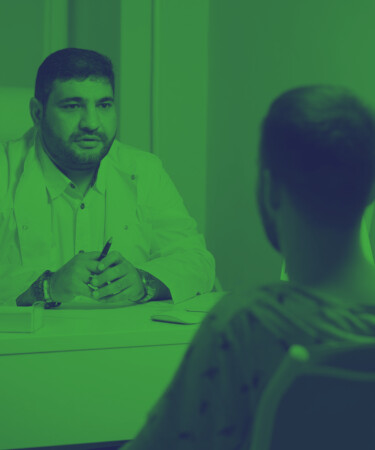
Protection of seriously ill people from deportation
Through our submission templates, we support lawyers in bringing the excessive legal requirements for proving an obstacle to deportation due to illness before the Federal Constitutional Court.
As with all public acts, public authorities must uphold fundamental and human rights in the case of deportations. The right to life and physical integrity prohibits forcibly taking people out of the country where to do so would significantly worsen their state of health or even endanger their life.
However, the reality is different: In recent years, the federal government has tightened the evidence requirements for proving an illness to such an extent that it is now hardly possible at all to prove an illness-related obstacle to deportation, especially for mentally ill individuals.
The excessive requirements for proving an obstacle to deportation are incompatible with the Basic Law. If there is a considerable danger to life and physical integrity, in the case of mentally ill persons, for example, an acute risk of suicide, no excessive requirements may be placed on the burden of proof. Public authorities and courts violate their duty to ascertain the relevant facts if they do not investigate specific indications of a serious illness.
The GFF, PRO ASYL and the Federal Association of Psychosocial Centres for Refugees and Victims of Torture (BAfF e.V.) want to bring this rights violation before the Federal Constitutional Court via strategic lawsuits. For this purpose, we provide lawyers with a comprehensive support package in administrative court proceedings - with submission templates, guidelines and a financial subsidy
You can find the submission templates and explanatory notes (in German) here.
Requirements for refugees often impossible to satisfy
§ Section 60a (2c) of the Residence Act provides that those affected must immediately submit a qualified medical certificate as proof of an obstacle to deportation due to illness. Especially in the case of mentally ill refugees, however, this proof often fails due to numerous practical hurdles. This concerns a group of people who are disproportionately affected by mental illness due to traumatic events such as war and persecution.
When those affected are in therapeutic treatment, it is usually not psychiatric treatment, but psychotherapeutic treatment. This is often organised and financed through psychosocial centres for refugees. Psychotherapeutic certificates are however often not recognised by the BAMF and the courts, even though psychotherapists, like psychiatrists, have the necessary expertise to conclusively diagnose a mental illness and its effects. Hence, seriously mentally ill people are deported time and again, even though the therapists treating them certify that they are at risk of suicide or that they are at risk of retraumatisation with serious health consequences. It is almost impossible for refugees to obtain a psychiatric certificate, let alone within the short deadlines of the asylum procedure. In many regions, the availability of psychiatrists is inadequate. Whether the costs of treatment are covered by the social welfare office is uncertain in many federal states. The same applies to the costs of interpreters. The medical certificate, which costs several hundred euros, has to be paid for by the asylum seekers themselves. At the same time, asylum seekers only have about 330 euros per month at their disposal under the Asylum Seekers' Benefits Act.
Constitutional principle of investigation
The excessive requirements for proving an obstacle to deportation are incompatible with the Basic Law. Public authorities and courts must investigate factual indications of a serious illness. Especially in the area of application of Article 2 (2) sentence 1 of the Basic Law, if there is a considerable and specific danger to life and limb, this obligation to ascertain the facts has constitutional weight. Therefore, no excessive demands may be placed on the persons concerned. Duties to cooperate must not be designed in such a way that they are virtually impossible for the persons concerned to satisfy. If the asylum seeker submits a meaningful psychotherapeutic certificate, it is the duty of the court to further investigate these indications of a health risk and, if necessary, to obtain a medical expert opinion.
Taking suitable cases to the Federal Constitutional Court
Jointly with PRO ASYL and the Federal Association of Psychosocial Centres for Refugees and Victims of Torture (BAfF), we want to take the excessive proof requirements in section 60a (2c) of the Residence Act to the Federal Constitutional Court. We will support suitable cases financially as well as with our legal expertise already in the administrative court proceedings. For this purpose, we not only provide legal arguments in submission templates, we also offer comprehensive instructions including letter templates to illustrate the practical impossibility of the legal obligations to provide evidence in specific cases.
You can find the submission templates and explanatory notes (in German) here.



